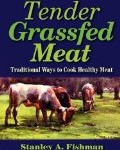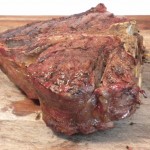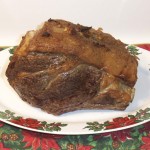Bulgarian Food Wisdom and Dr. Weston A. Price
By Stanley A. Fishman, author of Tender Grassfed Meat

 photo credit: Evgeni Karalamov
photo credit: Evgeni Karalamov
The people of Bulgaria are famous for their long life spans, and robust good health. At the beginning of the twentieth century, it was discovered that the Bulgarians lived longer than any other known people, having an astonishing number of centenarians. In fact, Bulgaria had a higher proportion of people 100 or older than any other nation. The question of why the Bulgarians lived so long and were so healthy has been studied for a long time. The original credit for Bulgarian health and longevity was given to a strain of bacteria found in their yogurt. This discovery led to yogurt becoming popular all over the western world. However, yogurt is only a small part of the traditional Bulgarian diet. A careful examination of the traditional foods of Bulgaria shows that they ate a diet quite similar to the diets eaten by the healthy peoples studied by Dr. Weston A. Price.
No wonder the Bulgarians lived so long and were so healthy!
The Diets Studied By Dr. Weston A. Price
Dr. Weston A. Price was a dentist in the early twentieth century. He noticed that each generation of his patients was less healthy than the previous generation and had worse teeth. Dr. Price decided that the answer was in nutrition, and he spent ten years traveling around the world to study healthy peoples who ate their traditional diets. He also studied what happened to these peoples when they ate modern food. Dr. Price discovered what the healthy peoples ate, and what they did not eat. The healthy peoples studied by Dr. Price did not have the chronic diseases that plague the modern world, like heart disease, cancer, diabetes, etc.
Dr. Price discovered that the healthy traditional diets had many things in common with each other.
High Animal Fat Consumption
The healthy peoples studied by Dr. Price ate a huge amount of animal fat from healthy animals, either pastured or wild. This included dairy fats such as butter, cheese, and cream, the natural fat of all kinds of animals, and the fat contained in the internal organs of animals, such as liver and kidney.
The traditional Bulgarian diet was full of animal fat from pastured animals and wild game. The natural fat of the animal was eaten with the meat. Meat was often cooked with large amounts of butter. Butter and cheese were often a vital part of traditional breads. Organ meats were very popular, even being eaten in soup. Large amounts of yogurt were eaten. The yogurt was always full-fat. A popular traditional drink was Aryan, which was made of yogurt and cold water blended together. Meat roasting in front of a fire was often basted with a chunk of animal fat. Large amounts of full-fat cheese were also eaten. Many Bulgarian breads and pastries were made with huge amounts of butter, often stuffed with full-fat cheese, or with cheese as a basic ingredient.
Meat and Game Eaten with Fat
The healthy peoples studied by Dr. Price valued meat as a food, whether it came from pastured animals or wild game. These peoples always ate meat with fat.
Pastured meat of all kinds was valued in Bulgaria, and wild game was a favorite. Meat in Bulgaria was almost always served with the natural fat, cooked with fat, and served with other foods containing fat.
Large Amounts of Organ Meats
The healthy peoples studied by Dr. Price valued the organs of animals as food, and ate large amounts of organ meats, particularly liver, but also heart, kidney, and many other organ meats.
The traditional Bulgarian diet valued all kinds of organ meats, serving them in many forms, with “Organs Soup” being a favorite dish.
Wild Fish and Seafood
The healthy peoples studied by Dr. Price ate plenty of wild fish and seafood if they could get it, with fish eggs being a valued food.
Wild fish and seafood were favorites in Bulgaria, and were widely and frequently eaten as part of the traditional diet. Fish eggs were valued, and often served.
Eggs and Poultry
The healthy peoples studied by Dr. Price ate large amounts of eggs, poultry, and other wild birds, if these foods were available.
Eggs and poultry were an important part of the Bulgarian diet. Eggs were not only eaten as a valued dish, but were added in large amounts to many other foods, such as traditional pasta and baking.
Fermented Foods
The healthy peoples studied by Dr. Price ate some fermented foods, often made from vegetables, on a daily basis.
Sauerkraut and other fermented foods were widely used in traditional Bulgarian cuisine, often being served at every meal in small quantities.
Fresh Vegetables and Fruits Grown in Rich Soil
Some of the healthy peoples studied by Dr. Price ate substantial amounts of vegetables and fruits, which were always grown organically, without chemicals, in rich soil full of nutrients.
Bulgaria had some of the richest soil on earth, and was famous for the wonderful qualities of their fruits and vegetables, which were widely eaten, and a crucial part of traditional cuisine.
No Refined Foods
The healthy peoples studied by Dr. Price did not use refined or industrial foods, like processed sugar. Everything was made from scratch, and the only processing was traditional ways of preserving and fermenting food. When a member of one of these healthy peoples moved to an area where they ate refined foods, they quickly lost their health, and often their teeth.
The Bulgarians traditionally made everything from scratch, using only traditional ways of preserving and fermenting foods. The Bulgarians did eat desserts made with lots of refined sugar and flour, but only on very rare occasions such as religious holidays. These rarely served desserts were served with a meal that was full of healthy fats and other healthy foods, which limited the damage done by the refined foods.
A Healthy Attitude Towards Food
So many people today are afraid of food. Traditional foods like animal fat are demonized, and blamed for almost every chronic illness. Traditional peoples did not blame food for disease, but saw their food as the very stuff of life, the source of life and health. Their traditions of how to cook and combine foods were carefully followed and provided excellent nutrition.
There is much evidence that modern processed foods create nutritional deficiencies that lead to all kinds of illness. This was never true of traditional foods prepared and served in traditional ways.
The traditional Bulgarian attitude towards food was very similar to that of healthy traditional peoples. The idea was to let your appetite be your guide as to what you should eat, and how much. In other words, eat what you desire, and as much of it as you desire, and let the needs of your body as expressed by your appetite be your guide.
This attitude works very well with traditional foods, containing the full range of needed nutrients.
Unfortunately, this attitude can lead to disaster with factory foods, which often lack vital nutrients, and are full of all kinds of artificial chemicals, sometimes chemicals designed to make you want to eat more of a particular processed food.
My solution is to avoid all factory foods, and let my appetite be my guide when I am eating real food only. It works beautifully.
The similarities between the diets studied by Dr. Price and the traditional Bulgarian diet are no coincidence. The principles discovered by Dr. Price are the best guide to great nutrition, and the traditional Bulgarian diet is yet more evidence of this fact.
This post is part of Real Food Wednesday, Fight Back Friday and Monday Mania blog carnivals.
Sorry, the comment form is closed at this time.
Read more
« Food Freedom Is a Basic Human Right
In Defense of Nutritious, Delicious Grassfed Butter »


 Photos of recipes from the new book Tender Grassfed Barbecue
Photos of recipes from the new book Tender Grassfed Barbecue
 Photos of recipes from the cookbook Tender Grassfed Meat
Photos of recipes from the cookbook Tender Grassfed Meat